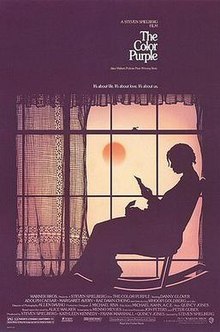| The Color Purple | |
|---|---|
 Theatrical release poster by John Alvin | |
| Directed by | Steven Spielberg |
| Screenplay by | Menno Meyjes |
| Based on | The Color Purple by Alice Walker |
| Produced by |
|
| Starring | |
| Cinematography | Allen Daviau |
| Edited by | Michael Kahn |
| Music by | Quincy Jones |
Production companies |
|
| Distributed by | Warner Bros. |
Release date |
|
Running time | 154 minutes[1] |
| Country | United States |
| Language | English |
| Budget | $15 million |
| Box office | $98.4 million |
The Color Purple is a 1985 American epic coming-of-age period drama film that was directed by Steven Spielberg and written by Menno Meyjes. It is based on the Pulitzer Prize–winning 1982 novel of the same name by Alice Walker and was Spielberg's eighth film as a director, marking a turning point in his career as it was a departure from the summer blockbusters for which he had become known. It was also the first feature film directed by Spielberg for which John Williams did not compose the music, instead featuring a score by Quincy Jones, who also produced. The film stars Whoopi Goldberg in her breakthrough role, with Danny Glover, Oprah Winfrey (in her film debut), Margaret Avery, and Adolph Caesar.[2][3]
Filmed in Anson and Union counties in North Carolina,[4] the film tells the story of a young African-American girl named Celie Harris and the brutal experiences she endured including domestic violence, incest, child sexual abuse, poverty, racism, and sexism.[5]
The film was a box office success, grossing $98.4 million against a budget of $15 million. The film received generally positive reviews from critics, with praise going to its acting (especially Goldberg's performance), direction, screenplay, musical score, and production values; criticism was directed by some for being "over-sentimental" and "stereotypical". The film was nominated for 11 Academy Awards, including Best Picture, Best Actress for Goldberg, Best Supporting Actress for both Avery and Winfrey, and Best Adapted Screenplay, but did not achieve a single win. It also received four Golden Globe Award nominations, with Goldberg winning Best Actress in a Drama. In 2006, the American Film Institute ranked the film 51st on its list of most inspiring movies.
- ^ "The Color Purple (15)". BBFC. April 10, 1986. Retrieved January 18, 2024.
- ^ Stewart, Robert W. (March 7, 1986). "Adolph Caesar: Fatal Heart Attack Fells Actor on Set". Los Angeles Times. ISSN 0458-3035. Retrieved November 9, 2018.
- ^ "Actor Adolph Caesar dead at 52". UPI News. March 7, 1986. Retrieved February 18, 2024.
- ^ "The Color Purple filming locations". The 80s Movie Rewind. Retrieved January 17, 2010.
- ^ Corliss, Richard (December 23, 1985). "Cinema: The Three Faces of Steve the Color Purple". Time. Archived from the original on June 4, 2008. Retrieved October 29, 2010.